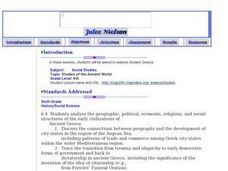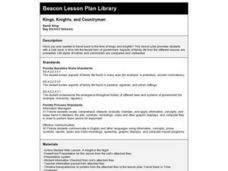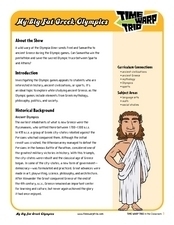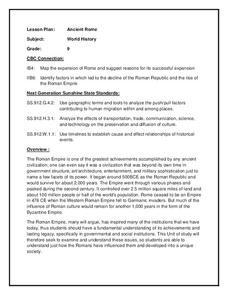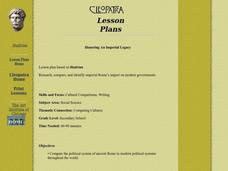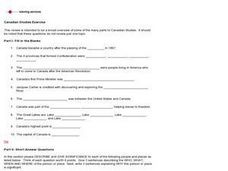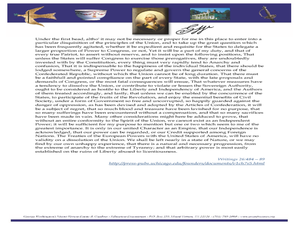Curated OER
Ancient China: Student Created Word Search Puzzles
Sixth graders classify and organize information about ancient China. In this Chinese history lesson, 6th graders create word search puzzles and record the processes they used to create them.
Museum of Tolerance
Citizenship Then and Now: Comparing Ancient Rome and Contemporary American Society
Class members research citizenship in Ancient Rome and in the United States and use the provided graphic organizers to compare the rights and responsibilities of citizens in these two democracies.
Curated OER
Studies of the Ancient World
Sixth graders, after taking a pretest, write a paragraph describing the difference between Athens and Sparta and write an article about the ancient Phoenicians, describing their contributions to world history. They compare democracy in...
Curated OER
Ancient Egyptian Culture
Fifth graders participate in a Webquest on Ancient Egypt. They identify clothing and jewelry, list the steps of mummification, decipher hieroglyphics, and complete a Travel Log.
Curated OER
Civilizations of the Ancient Near East
Sixth graders investigate ancient civilizations by creating a research project. For this world history lesson, 6th graders investigate historic civilizations developed close to important rivers of the near East. Students...
Curated OER
Following the Leaders
Examine the historic election of Pope Benedict XVI and reflect on the challenges he faces as the new leader of the Catholic Church. This New York Times instructional activity investigates how other world leaders are chosen in different...
Curated OER
The Republic; Roman History, Democracy
Students explain the ways in which current American system of government both resembles and differs from the system of government in Rome form about 510 to 264 B.C.
Museum of Tolerance
The Role of Citizens in a Participatory Democracy
Groups research participatory democracies and compare the role and rights of citizens in ancient history with those in recent U.S. history. Guided by a series of questions, individuals compose a persuasive essay in which they discuss the...
Curated OER
Kings, Knights, And Countrymen
Students look back in time into the feudal form of government. They view Powerpoint presentations to take them back in time.
Curated OER
The History of Money
In this social studies worksheet, students investigate the history of paper money and coins. Students read paragraphs about what early people used for money and what kinds of banks were used. Students complete a crossword puzzle.
Curated OER
Going Greek
Third graders learn about the life of a young boy in Greece and all about his cultural heritage. Pupils gather information about the history, culture, and the many influences the ancient Greeks had on modern day society. Terrific video...
Time Warp Trio
My Big Fat Greek Olympics
The Olympic Games are indeed a significant and far-reaching cultural component in our international community today, but from where do they originate? Where do our traditions stem from, and how do we choose the sports that constitute...
Miama-Dade County Public Schools
Ancient Rome
This resource outlines several general activities for a study of Ancient Rome, and includes guiding questions, a handout on the story of Romulus and Remus, and ideas for incorporating mapping and timeline activities into your review.
Curated OER
What is a Republican Government?
Students engage in a problem-solving activity examining some of the considerations involved in determining common welfare in creating a republican government.
Curated OER
Democracy: An Introduction.
Learners study the U.S. Constitutional System and how it compares with forms of democracy that developed in ancient Greece and Rome. They list and explain the requirements it takes to form a society to be considered a nation.
Curated OER
Honoring An Imperial Legacy
Students research, compare, and identify imperial Rome's impact on modern governments. They compare the political system of ancient Rome to modern political systems throughout the world.
Curated OER
Unity Versus Diversity
Students explore the 50 State Quarters program and how it represents diversity and unity of the United States. In pairs, they examine quarter designs to gain information about the culture of each state. Students create charts to...
Curated OER
Contributions of Ancient Egypt and China
Second graders study the contributions of Ancient Egypt and China, which have had an impact on world history, with emphasis on written language, laws, calendars, and architectural monuments such as the Pyramids and the Great Wall of China.
Curated OER
Canadian Studies Exercise
In this Canadian history worksheet, 6th graders review many aspects of Canadian studies. Students complete 10 fill in the blank questions, 5 essay questions and 10 true/false questions.
Curated OER
What is a Republican Government?
Students examine why the Founders of our country thought a republican government was best. They discover the Founders based our government on the government of Rome after much research and explore the advantages of a republican government.
Judicial Branch of California
Defining Civic Duty and Participation
A lesson, geared toward older elementary scholars, combines art with social studies to explain the purpose of civic duty and how to encourage others in the community to participate. Academics create advertising campaigns to promote civic...
National Endowment for the Humanities
The Greek Alphabet: More Familiar Than You Think!
In this Greek alphabet lesson, pupils explore the Phoenician origins to the Greek alphabet. Learners compare Greek letters to current letters and write a paragraph about the life of students in ancient Greece. They also identify...
Curated OER
George Washington & the Classics
Learners will compare and contrast famous philosophers with George Washington. In this history activity, students work in small groups to define Classicism, Legalism, Democracy, Republic and Civility, then read some short excerpts...
Curated OER
Parthenon
Ninth graders explore he purposes of the Parthenon. In this World History lesson, 9th graders create a complete picture of the Parthenon. Students research one aspect of the structure and report their findings back to the class.


